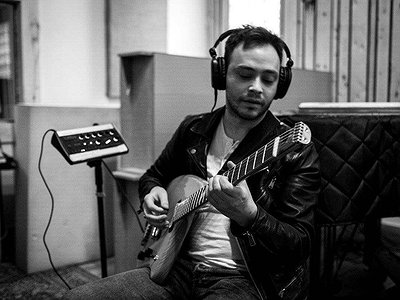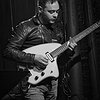Part 2
With more and more musicians creating than ever and more and more of these creations being released, what does this mean for you as an artist in terms of originality? What are some of the areas where you currently see the greatest potential for originality and who are some of the artists and communities that you find inspiring in this regard?
I feel like it is a wonderful time for music, and to be an artist. There are struggles for sure, but there is so much music available, and it's easier than ever to connect with other artists. I find that artists I consider to be very original are artists that operate on a level of consistent personal delivery.
When I was younger, I had an idea of originality being something I had never heard before but I don't feel that way anymore. An artist that I really love is Emiliana Torrini. She does not reinvent the wheel with her music or how it's produced, it just sounds very much like Emiliana Torrini. What I mean to say is that with more and more creating the best way to be original is not to draw attention to what makes your art innovative and revolutionary - it's the opposite to me. I am inspired by artists that are quietly personal, more so than artists that are abrasively challenging.
How strictly do you separate improvising and composing?
Improvisation is a core element of my playing as well as my composing. For me the only real difference between the two is that with improvisation I attempt to make the listener think about the present and with composition I attempt to make them feel something they can relate to regardless of the tense. Of course maybe it winds up working the other way around or maybe nothing happens. I can’t picture making music without using both.
How do you see the relationship between sound, space and composition and what are some of your strategies and approaches of working with them?
I am a big advocate of space in composition. My favorite music to listen to almost always has a focus on a spatial relationship to the melodic, harmonic and tonal. I attempt to utilize space when I write by making short melodies that can breath easily when played as a solo piece. A way of double-checking myself is attempting to write songs that I can teach to any number of musicians on any instrumentation in under 5 minutes. I want my music to be simple enough to be quickly learned by ear, while maintaining a spatial elasticity that offers the option of personal insight from other musicians if I decide I want that.
What's your perspective on the relationship between music and other forms of art – painting, video art and cinema, for example – and for you and your work, how does music relate to other senses than hearing alone?
The relationship between music and other art forms is one of my favorite elements of the craft. My father is a painter as well as a musician, he played pedal steel on my debut release Innocent Speller (Composers Concordance Records/Naxos of America), and painted the album cover.
Imagery and sound are a powerful combination in achieving intention in art. I regularly work with my friend and astounding painter Michael Hafftka in a project that combines his visual art as a means to lead improvisational music. It is always a completely inspiring experience. I also regularly compose music for dance which is another instance where both art forms inform each other, creating a new delivery in the moment weather it is composed or improvised. The same goes for scoring films. Music is more present than most art forms in day to day life - it's literally everywhere. If you walk down the street, go to a corner store, go to the doctor, get put on hold - everywhere. That familiarity has the potential to make music a boring and mundane part of life, but it's totally the opposite. When music combines with other art forms, what you hear is accentuated and focused to come at you in a way that each person has no choice but to receive in their own way.
What's your view on the role and function of music as well as the (e.g. political/social/creative) tasks of artists today - and how do you try to meet these goals in your work?
I take the position with my music of offering simplicity. In the context of society, politics, and art, simplicity is one of the only consistent longings I have. I suppose you could say my role is to put that out there and see if others agree and/or relate.
Listening is also an active, rather than just a passive process. How do you see the role of the listener in the musical communication process?
I see the listener as one who requires engagement. Although I hope to challenge and provoke the listener to think and feel, I have no interest in alienating any listener that hears my music. I try to write music that gives a listener something to hold on to immediately. They might not like my music which is fine, but I don't like the idea of trying to make them uncomfortable. I see the role of the listener as one of curiosity - it's up to me to encourage their questions, or try to give them an answer.
Reaching audiences usually involves reaching out to the press and possibly working with a PR company. What's your perspective on the promo system? In which way do music journalism and PR companies change the way music is perceived by the public?
PR and music journalism is a way to potentially reach enormous amounts of people that would never hear you otherwise. It's extremely important, and also comes in many forms. I do everything myself currently - I book performances, set up tours, make travel arrangements, set budgets, reach out to journalists, go to as many performances as I can to meet other artists and support music that I love. On top of writing music and session work, that keeps me pretty busy, and I'd obviously love some help with it! But sometimes you're better off doing it all yourself. Nobody cares about my music more than I do, and at the end of the day I'll work harder to get it heard. The tricky thing is the public will see and hear your presence on a way larger scale if a good PR company backs you. All an artist can do is work non-stop and see what happens.
Do you have a musical vision that you haven't been able to realise for technical or financial reasons – or an idea of what music itself could be beyond its current form?
My musical vision is really just to tour often and release music to an audience that values what I do. As far as the financials go, enough to continue doing that is fine. I really just want to travel and play my music and never stop. So far so good!
You can find Charlie online at soundcloud.com/charlie-rauh






